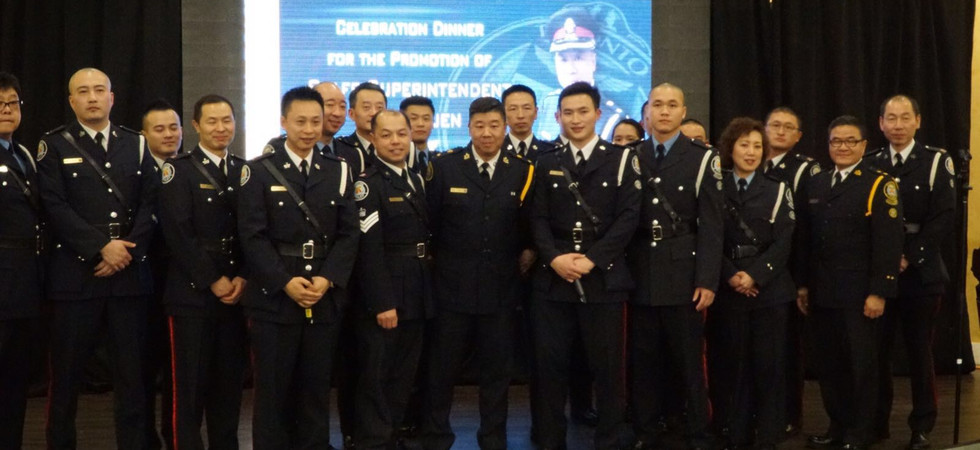Peter Yuen - The highest-ranking officer of Chinese heritage within the Toronto Police forces.
Peter Yuen - The highest-ranking officer of Chinese heritage within the Toronto Police forces.
by: Connie Woo - Asian Business Network Association (ABNA)
Peter Yuen reached new heights in his career when he was promoted to Staff Superintendent in February 9 this year, becoming the highest-ranking officer of Chinese heritage within the Toronto Police forces.
His life journey to get to where he is today is solid proof that one can be a shining star in any career. When one listens to his personal story, and sees the dedication that he devotes to his duties, as well as the effort and time that he spends on working with the younger generation, one will fully appreciate Peter’s motto for life: ‘Find the means to success; don’t make excuses for failure’.
Peter is someone who always looks forward, and not only to his own future. As an example, recently he accepted the invitation of Vision Youth Leadership Program to be a curriculum advisor for their program, responsible for designing the content of the leadership training program. In 2008, he launched ‘Kick Start to a New Career’, a career workshop that has received enthusiastic response from the community since then, and this year, he will be attending as keynote speaker. In addition to that, Peter actively contributes to and participates in many community activities.
Peter is concerned about today’s youth development, and hopes that more police officers will get involved. He feels that the next generation of youths have three major issues: they are too self-centered, lack social skills, and are apathetic about what goes on around them. Spoiled by their parents, they don’t have to face physical or psychological hardships growing up. As a result, they focus too much on themselves, lacking both collaborative skills and a sense of social responsibility.
Peter hopes that sharing his personal experiences will help youths better understand themselves. Self-awareness is a critically needed skill. One cannot overestimate oneself and set too high a goal only to fail; nor can one underestimate one’s ability and be too timid in one’s pursuit. Peter has come to appreciate that understanding one’s own capability and interests is key to pursuing one’s goal with determination and hard work. His colorful and legendary past, with many ‘defining moments’ in his life, are what mold his life values, allowing him to become who he is today.
Peter was born in Hong Kong, and immigrated to Canada with his family at the age of eleven in 1975. Like all new immigrants, he had to adapt to a new environment, a new culture, and a new language. Since both of his parents had to put in 12-hour days at work, Peter, being the big brother, was responsible for looking after his younger brother and sister. He could only envy his friends playing baseball and hockey. Only when he started a part-time job at fourteen was he able to save money to buy a bike and a baseball glove.
Peter graduated from high school with top marks, and hoped to study history in university, but his parents nixed that idea. Just like most Chinese Canadian parents, they wanted their children to become lawyers, doctors or engineers. Peter laments that even today many Chinese Canadians still hold on to this belief, giving their children a lot of pressure. At that time he could not escape that pressure. To please his parents, he enrolled in chemical engineering at McMaster University. Since this was not his area of interest, he became unmotivated, staying around the campus pool hall all the time. Suspended by the university, he moved to Ottawa to hang out with friends, supporting himself by visiting underground gaming houses, and generally leading a life that teetered on society’s edge.
Just as Peter was feeling lost at the crossroads of life, he saw a police recruitment ad in the newspapers. He felt right away that this could be a good choice and applied for a position. In 1987, he joined the Toronto police forces. Peter says at that time he would only think about one day at a time, not even thinking about tomorrow, let alone planning for the future. Now when he thinks back to that time, joining the police forces was a defining moment in his life, shaping his future with that first step.
Over the course of his 25-year policing career, Peter has been in uniform patrol, undercover work, criminal investigation, community response, Asian organized crime, the homicide squad, human resources, professional standards and duty operations.
The most fearful moment in his life came in 1990 when he was at the 42nd district working at the criminal investigative unit. He was assigned to infiltrate an illegal gambling house where bets were made on horse racing in Hong Kong via long distance phone calls. The police unit had planned to sweep this underground gambling house that night, with him operating undercover inside. Before the police took action, four gangsters from Vietnam and Hong Kong carried out an armed robbery of the gambling den, ordering all gamblers present to throw down their wallets on the floor.
As the robbers searched each wallet, they discovered a Toronto Police badge in one of the wallets. They ordered the undercover policeman to identify himself; otherwise they would shoot down one person each minute. In that defining moment, Peter stood up to reveal his identity and was beaten soundly. In the end they put a handgun inside his mouth and pulled the trigger, but the bullet was stuck inside the gun barrel. Having gone to the gates of hell and back, Peter told the robbers that the police were outside and they would not be able to escape.
From that point on, Peter feels deeply that each of us is but a speck of dust in the universe. In the blink of an eye, the dust turns into nothing. He says: We should use our time on earth to do meaningful things. Everyone has a precious gift. If you don’t have this gift, it is not because the gift does not exist, it is because you have not fought for it.
Thinking back to the moment when his life hung on the balance, Peter says at the time he felt that as a police officer, he had to be accountable to the police force, and to the public. That was why he made the risky decision that could have cost his life. This sense of responsibility has always been the motivation for him to continue to challenge and improve himself.
In 1996 Peter was promoted to the rank of Sergeant. In 2000, he was promoted to Staff Sergeant, 2006 Inspector, 2012 Staff Inspector and this year he has been promoted to Superintendent.
Peter believes that success comes from working hard at one’s job. No doubt each promotion brings him a lot of joy, since it means his superiors and also the community at large have recognized his work, but at the same time each promotion brings him a greater sense of responsibility and challenge.
Throughout the years, Peter has been recognized numerous times for his outstanding police work, including Police Officer of the Year (1990), Community Law Enforcement Award (2005), Professional Excellence Tribute Award, Merit Mark, Chief of Police Award of Excellence…etc. Peter has been recognized as ‘Expert on Asian organized crime’ by the Ontario Courts.
In 2009, Peter completed his bachelor’s degree in Justice Studies and master’s degree in Leadership at the University of Guelph. Now teaching leadership skills to other police officers is within the scope of his work. He hopes to pass the torch and impart his enthusiasm for police work and community service and his deep sense of responsibility to those around him. For him, the greatest satisfaction comes from seeing the performance of his staff.
Looking down the road, Peter’s personal vision is to teach, work with the younger generation and build bridges between the community and police forces. He also hopes to encourage Chinese Canadians to get involved in social and political issues, and fulfill their social responsibilities. He feels Chinese Canadians should present a more united front.
Peter says that the most important obstacles in the way of new Chinese Canadians joining the police forces are mental blocks and attitude problems, in addition to cultural differences as well as limited English skills. Sometimes in public, he hears parents say to their children,’ don’t be naughty, or the police will take you away.’ Peter would tell them, ‘Police will not just take people away. Please don’t make the police out to be such horrible people.’
Peter also says that there are now about 200 police employees (including police officers and office staff) of Chinese heritage, a major improvement when compared with only three police officers of Chinese heritage back in 1987 when he joined.
Does Peter aspire to an even higher position? Peter says undoubtedly he will continue to try to find the means to success, because he hopes to have more impact on more people, do more things for others, and he will not belittle himself just because he happens to be a member of a minority.
Peter’s theory of success can be our conclusion here: ‘One does not succeed without reason; one does not fail without cause. As long as we persevere, and face life’s ups and downs with courage, we will be able to seek the means to success and not look for excuses for our failure. No matter how you end up in life, you can tell yourself, I have fought the good fight. I have no regrets because I have truly lived.’

